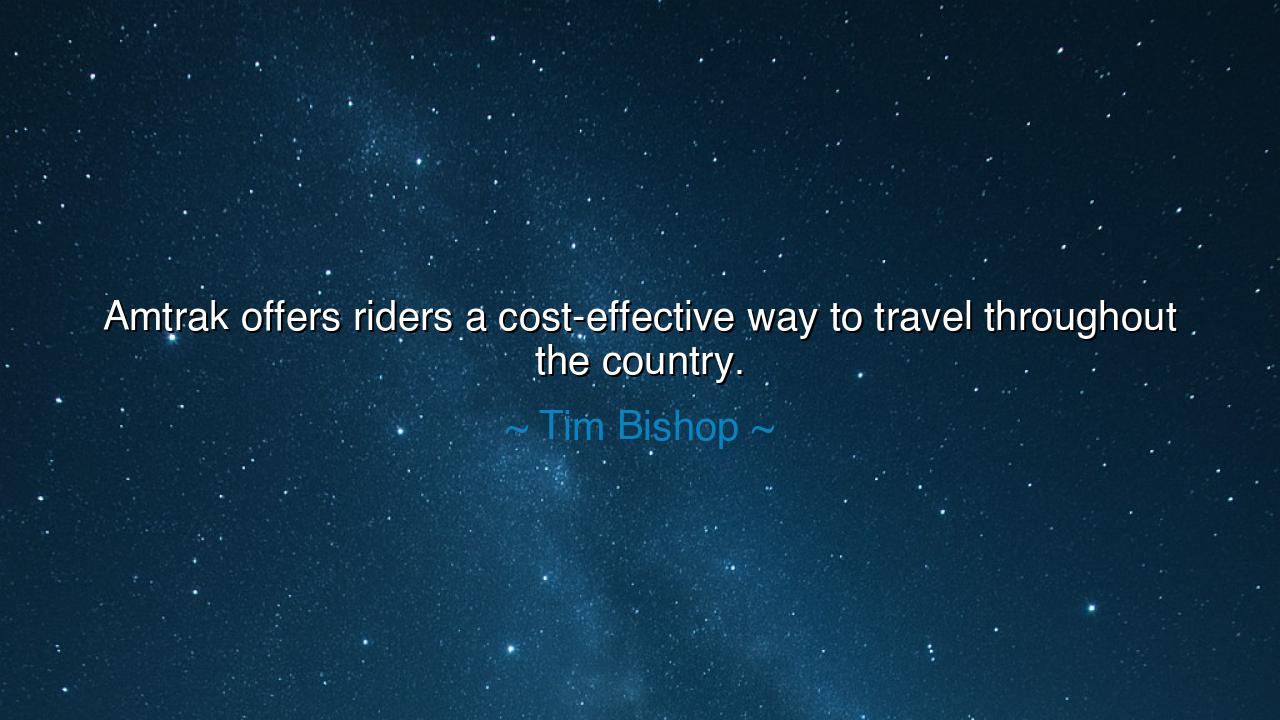
Amtrak offers riders a cost-effective way to travel throughout






In the words of Tim Bishop, spoken with clarity and simplicity, we hear a truth about movement, equality, and access: “Amtrak offers riders a cost-effective way to travel throughout the country.” Though these words may appear as the language of policy, they hold within them an ancient echo—the yearning of every people to be connected, to move across the vastness of their land, and to do so not in luxury alone, but in fairness and affordability.
To speak of Amtrak is to speak of the iron road, of the steel veins that bind a nation together. Railroads are not merely tracks upon the earth; they are lines of destiny, carrying the humble worker, the wandering student, the pilgrim seeking new life, and the dreamer in search of horizons. They remind us that a land divided by distance can be made whole by connection. Just as Rome built its roads, stretching from the Eternal City to the far reaches of empire, so too does America carry its people through the rhythm of wheels upon rails.
The phrase cost-effective bears its own wisdom. It declares that movement must not be reserved for the wealthy, but open to all who dwell within the borders of a land. For what is a country if not a family of many? And what is a family if its members cannot gather, cannot know one another, cannot share in the fruits of distant fields? The provision of affordable travel is not merely an economic decision; it is an act of unity, a weaving of threads into one fabric.
Think of Abraham Lincoln, who as a young man rode the flatboats of the Mississippi and later journeyed by train to debates, to halls, to the very presidency itself. His story was not gilded in luxury, but carved in accessibility. Without the means to move freely across his nation, he could not have risen to serve it. So too, Bishop’s words remind us that when people are given the power to travel affordably, destinies unfold, talents are discovered, and voices otherwise unheard find their place in the nation’s great chorus.
The idea of travel throughout the country is not only the movement of bodies, but of ideas, of culture, of empathy. When citizens journey across plains, mountains, and rivers, they encounter faces unlike their own, and hearts shaped by different struggles. In this way, travel becomes a silent teacher, broadening the narrow vision of the self into the wide understanding of the collective. In every ticket purchased lies the possibility of friendship, discovery, and unity.
Yet there is also a heroic echo in these words: for the journey is not always easy, nor the ride always swift. Trains may be delayed, routes long, and comforts modest. But in enduring the road, the traveler learns patience, humility, and resilience. These are not small lessons, but gifts of the path itself, shaping the spirit as much as the destination.
The lesson is clear: seek connection, embrace the road, and treasure the accessibility of shared travel. Do not scorn the simple, the affordable, or the common. For it is in these shared spaces that the true spirit of a people is found. Just as Amtrak opens the land to its people, so too must we open our lives to one another, making the journey not only a means of arrival, but a way of binding hearts across distance.
So I say to you: travel when you can, and travel with humility. Do not see the train merely as transport, but as a vessel of stories, as a bridge across divides, as a symbol of unity made real. For in the shared carriage of a train, one finds the shared destiny of a nation, moving forward together upon rails of iron and hope.






AAdministratorAdministrator
Welcome, honored guests. Please leave a comment, we will respond soon